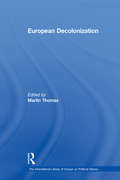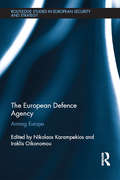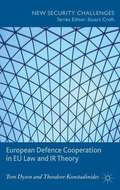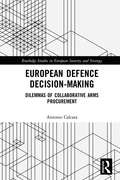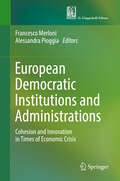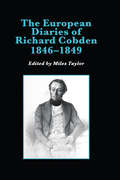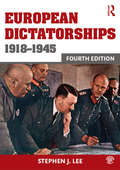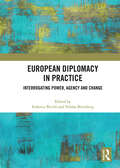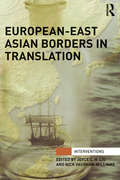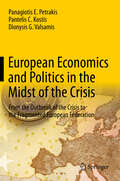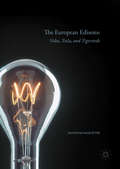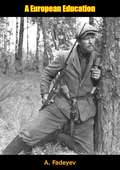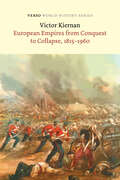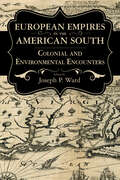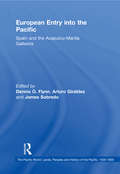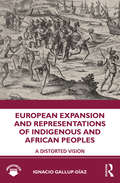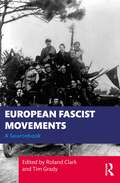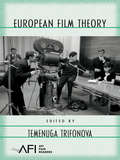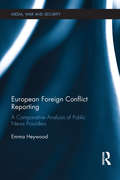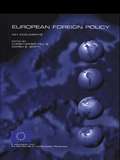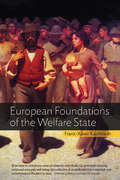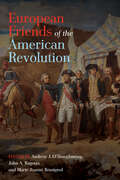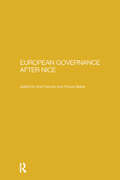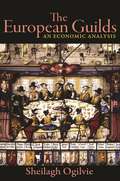- Table View
- List View
European Decolonization (The International Library of Essays on Political History)
by Martin ThomasThis collection brings together twenty-one key articles that explore the nature and impact of colonial withdrawal. Ranging across all the European colonial powers, the articles discuss various aspects of decolonization, including the role of political violence, changing popular attitudes to empire and the inter-actions between colonial conflict and Cold War.
The European Defence Agency: Arming Europe (Routledge Studies in European Security and Strategy)
by Nikolaos Karampekios Iraklis OikonomouThis volume provides a comprehensive understanding of the European Defence Agency (EDA), the leading EU armaments policy institution. Despite its critical role in European strategic and military affairs as the key hub of European policy-making in the field of armaments, the Agency has hitherto received very little attention by the academic and research community around Europe. To fill this gap in the literature, the book covers a multitude of inter-related themes and topics. Not only does it provide a detailed analysis and assessment of the Agency’s record as the first institution dealing solely with EU armaments policy, but it also links these findings to international relations and European integration theory. Thematically, the contributions go beyond the mere description of achievements, gaps and risks, elaborating on novel themes such as space, offsets, pooling and sharing, and transatlantic armaments relations. The book combines an interdisciplinary approach to the study of European defence with theoretical and ontological pluralism, and seeks to unveil the strategic, industrial, institutional and ideational sources of armaments collaboration and capability development under the aegis of the EDA. The multi-faceted orientation of the book will be of much interest to students of European security, EU institutions, defence studies, arms control and international relations in general.
European Defence Cooperation in EU Law and IR Theory
by Tom Dyson Theodore KonstadinidesThis book offers a novel contribution to the study of post-Cold War European defence. Interdisciplinary in approach, it uses European law to assess the utility of existing theoretical accounts. By exploring the balance of threat theory, it provides new insights into the forces driving and hindering European defence cooperation.
European Defence Decision-Making: Dilemmas of Collaborative Arms Procurement (Routledge Studies in European Security and Strategy)
by Antonio CalcaraThis book comparatively examines the preferences of four key arms-producing states towards European joint armaments programmes. The European defence market is characterised by a mixture of inter-state competition and European cooperation, and this work assesses why countries sometimes decide to cooperate with their partners, while in other instances they refrain from doing so. In order to shed light on this empirical puzzle, the book focuses on state-defence industry relations in the four major European arms producers: France, Germany, Italy and the UK. The main argument is that the public or private governance of industrial suppliers and market size are the two decisive variables that explain the simultaneous presence of cooperation and competition in European defence procurement. Specifically, it argues that in public governance ecosystems, arms industries are able to "capture" the state's decision-making processes to their own advantage. In private governance ecosystems, the state is relatively autonomous from defence industry's influence and able to pursue larger macro-economic and military benefits. Moreover, the strategy pursued by governments and defence firms is decisively shaped by market size because of its importance in determining the relative costs and benefits of collaborative arrangements. This book will be of much interest to students of EU policy, defence studies, European politics and International Relations.
European Democratic Institutions and Administrations: Cohesion and Innovation in Times of Economic Crisis
by Francesco Merloni Alessandra PioggiaThis book presents the results of extensive international comparative research into the effects of the economic and financial crisis on democratic institutions and social cohesion policies. The collected studies describe and analyse the measures (often referred to as "reforms") adopted to counter the crisis and the effects of these measures.It investigates three areas: the impact on the functioning of institutions, with respect to the relationship between representative institutions and governments, and the organisational structure of administrations at national and local levels; the impact that the austerity policies on public spending have on social rights; and the impact on traditional instruments of public action (administrative simplification, public services delivering, the use of common assets).The general findings highlight the effect of reducing the administrative and government capacity of the democratic institutions: the public sector, rather than being innovative and made more effective, declines, offering increasingly poor public services and making bad decisions, fuelling substantive or formal privatisation solutions, which in turn cause further weakening.
The European Diaries of Richard Cobden, 1846–1849
by Miles TaylorAn account of the European vision of one of the most influential statesmen and thinkers of the nineteenth-century. This edition of the previously unpublished travel diaries of the M.P. and economic writer Richard Cobden (1804-1865) is not only a revealing account of Anglo-European politics before, during and after the year of revolutions, but is also a travel guide to Europe in the pre-railway age and a contribution to the intellectual biography of an English provincial radical who became a major European celebrity, one of the founders of Free Trade. During his extensive continental travels Cobden met most of the monarchs and leading statesmen of Europe, as well as artists, writers, churchmen and fellow-travellers. His tour through France, Spain, the Italian states, Austria, Prussia, Russia and the Hanseatic ports let him witness the struggles between order and progress which led to and succeeded the great upheavals of 1848. The diaries reveal Cobden in a new light - a determined European, convinced that economic cooperation and not protectionism and militarism was the only way to preserve international stability.
European Dictatorships 1918–1945
by Stephen J. LeeEuropean Dictatorships 1918-1945 surveys the extraordinary circumstances leading to, and arising from, the transformation of over half of Europe's states to dictatorships between the first and the second world wars. From the notorious dictatorships of Mussolini, Hitler and Stalin to less well-known states and leaders, Stephen J. Lee scrutinizes the experiences of Russia, Germany, Italy, Spain, Portugal and Central and Eastern European states. This fourth edition has been fully revised and updated throughout. New material for this edition includes: the most recent research on individual dictatorships a new chapter on the experiences of Europe's democracies at the hands of Germany, Italy and Russia an expanded chapter on Spain a new section on dictatorships beyond Europe, exploring the European and indigenous roots of dictatorships in Latin America, Asia and Africa. Extensively illustrated with images, maps, tables and a comparative timeline, and supported by a companion website providing further resources for study (www.routledge.com/cw/lee), European Dictatorships 1918-1945 is a clear, detailed and highly accessible analysis of the tumultuous events of early twentieth-century Europe.
European Diplomacy in Practice: Interrogating Power, Agency and Change
by Federica Bicchi Niklas BrembergThis book aims to show practice approaches at work in the fields of European diplomacy and security broadly conceived. It sets out to provide readers with a hands-on sense of where research on social practices and European diplomacy, security and foreign policy currently stands. The book reviews how practice approaches have evolved in International Relations (IR) and brings together an unique set of contributions which highlights how insights from practice approaches can be applied to advance research on a number of key issues in these fields. While the debate about practices in IR goes beyond the case of diplomacy, the latter has become a showcase for the former and this book continues the debate on practices and diplomacy by zooming in on the European Union. Examples of issues covered include the evolution of EU-NATO relations seen from the perspective of communities of practice, burden sharing as an anchoring practice for European states’ involvement in crisis management operations, the practical knowledge shaping the EU’s responses to the Arab Uprisings, agency as accomplished in and through EU counter-piracy practices and the political resistance to Israeli occupation and the non-official recognition of Palestine performed by EU diplomats. Thus, by focusing on specific practices and analytical mechanisms that contribute to understand the transformations of European diplomacy, security and foreign policy, this book provides essential readings to anyone interested in innovative ways to grasp the contemporary challenges that face the EU and its member states. The chapters originally published as a special issue of European Security.
The European Discovery of America: The Northern Voyages A.D. 500--1600
by Samuel Eliot MorisonIn Samuel Eliot Morison's saga, he offers a comprehensive account of all the known voyages by Europeans to the New World from 500 A.D. to the seventeenth century. Together, the two volumes of The European Discovery of America tell the compelling stories of the many intrepid explorers who made what was then a journey fraught with danger--figures as diverse as Leif Ericsson, Columbus, John Cabot, Jacques Cartier, Martin Frobisher, Magellan, Sir Walter Raleigh, and Sir Francis Drake to name but a few. They also follow the adventures of lesser-known but no less interesting mariners and offer a detailed look at those who set them forth on their travels.
European-East Asian Borders in Translation (Interventions)
by Nick Vaughan-Williams Joyce C.H. LiuEuropean-East Asian Borders is an international, trans-disciplinary volume that breaks new ground in the study of borders and bordering practices in global politics. It explores the insights and limitations of border theory developed primarily in the European context to a range of historical and contemporary border-related issues and phenomena in East Asia. The essays presented here question, rather than assume, the various borders between inclusion/exclusion, here/there, us/them, that condition the (im)possibility of translating between histories, cultures and identities. Contributors suggest that the act of translation offers new ways of thinking about how border logics operate, taking on the concept of translation itself as border problematic and therefore raising questions of power and authority, such as who gets to act as a translator, or who benefits from the outcome. The book will appeal not only to upper-level students and scholars with a geopolitical-historical interest in East Asia, but also to those who work in the inter-disciplinary field of border studies and others with an interest more generally in translation and the extent to which theory ‘travels’ across time and space.
European Economics and Politics in the Midst of the Crisis
by Panagiotis E. Petrakis Pantelis C. Kostis Dionysis G. ValsamisThis book presents an overview of the economics and politics implemented in the European Union and especially the Eurozone during the crisis of 2008-2012. Although it focuses on these four years, the analysis starts from the establishment of the European Union and covers the period up to the outbreak of the Cypriot banking crisis in mid-2013. The long-term creation of structural changes in European economics and politics is associated with a growth lag within the global economic environment dynamics. The economic and political consequences of the crisis and the development of new institutions will shape the future growth dynamics towards a Fragmented European Federation.
The European Edisons
by Anand Kumar SethiThis book explores the lives, inventions, discoveries, and significant work of three extraordinary European inventors with noteworthy links to the great Thomas Alva Edison - Alessandro Volta, Nikola Tesla, and Eric Tigerstedt. It explores the business and scientific legacies that these men have contributed to the modern world. Despite prejudices, ill health, financial stringency, geopolitical situations, business rivalries, and in many cases just awful luck, they remained determined to deliver extraordinary scientific and technological developments to a skeptical and unappreciative world. This book is a testament to anyone pursuing their technological dreams for the benefit of society, and will enhance the literature for scholars, researchers, and the well-informed reader with an interest in science, technology, and the personalities involved in history.
A European Education
by Romain GaryA NOVEL OF DESPERATE LOVE, BITTER HOPE, CHILLING COURAGE AND RELENTLESS BRAVERY“THIS quietly terrible parable for our times was first published in France fifteen years ago and was awarded the Prix de Critiques. It was translated into fourteen languages, but not into English. Since then M. Gary has won international fame with several other books. Now an entirely rewritten and, M. Gary hopes, a much improved version of A EUROPEAN EDUCATION is published in English for the first time.“A too hasty glance at A EUROPEAN EDUCATION might give the impression that no novel has ever borne a more sadly ironical title, because this is a story of innocence ‘educated’ in all the horrors and atrocities of modern war. But some of the graduates of the twentieth century’s school of despair learned something other than the subjects taught. They learned that man’s dream of freedom, of dignity and of love, is immortal; that his faith in a future without hatred cannot be destroyed.”—Orville Prescott in THE NEW YORK TIMES“A EUROPEAN EDUCATION is a story of unmitigated privation and terror. But it is also the story of the human heart’s triumph over evil even in the exercise of evil.“A EUROPEAN EDUCATION is about a group of partisans called the ‘green ones’ because they live in the forests of Poland. They hide in caves, steal food and sabotage every effort of the Germans.“Before the book ends, the hero has become a man; he has killed; he has learned how to steal without being caught, how to make friends with the Germans whom he intends to kill, and how to love.“The title is inherent in Janek’s bitter summing up of what he has learned; ‘...all this European education comes down to is to teach you how to find the courage to shoot a man who sits there with lowered head....’“This may not be Romain Gary’s most popular book, but it is a little masterpiece and may prove to be his.”—THE CHICAGO TRIBUNE
European Empires from Conquest to Collapse, 1815-1960
by V.G. KiernanNew edition of a trail-blazing history of imperial warfareEuropean Empires from Conquest to Collapse is a vivid anticolonial reckoning with the history of imperial warfare. Global in scope, it deftly surveys the fighting forces and military engagements of the Great Powers, from the British in India to the scramble for Africa. Victor Kiernan lays bare the doctrines and realities of colonial fighting, dispelling official legends. Europe often boasted that coloni- alism was &‘civilised&’, but the facts show it could be barbaric. Kiernan traces how guerrilla insurgency against colonial oppression developed into one of the most sophisticated branches of the art of war.With a foreword by Tariq Ali, author of Winston Churchill: His Times, His Crimes.
European Empires in the American South: Colonial and Environmental Encounters (Chancellor Porter L. Fortune Symposium in Southern History Series)
by Joseph P. WardContributions by Allison Margaret Bigelow, Denise I. Bossy, Alejandra Dubcovsky, Alexandre Dubé, Kathleen DuVal, Jonathan Eacott, Travis Glasson, Christopher Morris, Robert Olwell, Joshua Piker, and Joseph P. Ward European Empires in the American South examines the process of European expansion into a region that has come to be known as the American South. After Europeans began to cross the Atlantic with confidence, they interacted for three hundred years with one another, with the native people of the region, and with enslaved Africans in ways that made the South a significant arena of imperial ambition. As such, it was one of several similarly contested regions around the Atlantic basin. Without claiming that the South was unique during the colonial era, these essays make clear the region’s integral importance for anyone seeking to shed new light on the long-term process of global social, cultural, and economic integration. This volume includes essays on all three imperial powers, Spain, Britain, and France, and their imperial projects in the American South. While the consequences of Indian encounters with European invaders have long remained a principal feature of historical research, this volume advances and expands knowledge of Native Americans in the South amid the Atlantic World.
European Entry into the Pacific: Spain and the Acapulco-Manila Galleons (The Pacific World: Lands, Peoples and History of the Pacific, 1500-1900 #4)
by Dennis O. Flynn Arturo GiráldezWorld history conventionally ignores or underestimates the importance of Manila, the Manila galleons, and the Philippines as key stages in the development of trans-Pacific contact and of the world economy. Essays in this volume discuss Philippine-Asian exchanges prior to the entry of Europeans, and then look at European influences and the impact of Magellan’s voyage, and the emergence of Manila as one of global trade’s crucial linchpins during four centuries. Linkages between Latin America and China, and Spanish-Japanese competition for the Chinese marketplace are important topics. Tensions and cooperation among Chinese, Japanese, Iberians, Africans, Christians, Muslims and others on Philippine soil are also covered. This volume suggests the need for thorough re-evaluation of the Philippines’ central role in terms of both Pacific history and global history as perhaps the single most important stage in the traffic that linked China and Latin America.
European Expansion and Representations of Indigenous and African Peoples: A Distorted Vision
by Ignacio Gallup-DíazThis book presents a bold, multifaceted interpretation of early English imperial actions by examining the ways in which English empire-builders and travelers interacted with Indigenous and African peoples during the long process of colonization in the Americas. Ignacio Gallup-Díaz argues that early English imperial actors were primarily motivated by practical concerns rather than abstract ideologies—from reacting to, learning from, and avoiding the ongoing Spanish and Portuguese imperial projects to the dynamic collision of English imaginings of empire with the practical realities of governing non-European peoples. The text includes an appendix of primary sources that allows students and instructors to engage with English imperial thinking directly. Readers are encouraged to critically examine English accounts of this period in an attempt to see the Indigenous and African peoples who are embedded in them. European Expansion and Representations of Indigenous and African Peoples provides an invaluable new framework for undergraduate students and instructors of early American history, Atlantic history, and the history of race and imperialism more broadly.
European Fascist Movements: A Sourcebook
by Roland Clark Tim GradyThis volume offers a fresh and original collection of primary sources on interwar European fascist movements. These sources reflect new approaches to fascism that emphasise the practical, transnational experience of fascism as a social movement, contextualising ideological statements within the historical moments they were produced. Divided into 18 geographically based chapters, contributors draw together the history of various fascist and right-wing movements, selecting sources that reflect themes such as transnational ties, aesthetics, violence, female activism, and the instrumentalisation of race, gender, and religion. Each chapter provides a chronological, narrative account of movements interspersed with complete primary sources, from political speeches, internal movement circulars and articles, police reports, oral history, songs and music, photographs, artworks, poetry, and anti-fascist sources. The volume as a whole seeks to introduce readers to the diversity of fascist groups across the continent, to show how fascist groups were constituted through social bonds, rather than around fixed ideologies, and to capture the inexperience and ad hoc character of early fascist groups. With an Introduction that explains the volume’s theoretical approach and elaborates on the chronology of European fascism, this is the perfect sourcebook for any student of Modern European history and politics.
European Film Theory (AFI Film Readers)
by Temenuga TrifonovaEuropean Film Theory explores the ‘Europeanness’ of European film theory, its philosophical origins, the ‘culture wars’ between ‘Continental’ and ‘Analytical’ film theory and philosophy, the major discursive and epistemological shifts in the history of Continental film theory, the relationship between Continental philosophy of art and philosophy of history and European film theory. Writing from a range of disciplines and perspectives, the contributors to this new volume in the AFI FILM READERS series offer fresh interpretations of European film theorists and illuminate the political potential of European film theory.
European Foreign Conflict Reporting: A Comparative Analysis of Public News Providers (Media, War and Security)
by Emma HeywoodThis book explores the state of European foreign conflict reporting by public-sector broadcasters, post-Cold war and post-9/11. It compares the values of three television news providers from differing public systems: BBC’s News at 10, Russia’s Vremya and France 2’s 20 Heures. The book examines how these three news providers have reported and broadcast the ongoing Israeli–Palestinian conflict, which pre-dates both the change in East-West relations and the events of 9/11. In doing so, the work identifies and analyses the role of public and state-aligned broadcasters and illustrates how certain news values are consistently prioritised by the broadcasters and the effect this has on how news stories are portrayed. The book is divided into two parts. Part I focuses on 2006 to 2008 and provides a detailed quantitative overview of the broadcasters’ news values. Part II provides an update of the analysis by examining coverage of the war in Gaza 2014 and discusses the findings from audience research into perceptions of this latter war. This book explains that not only do hierarchies in news values exist in foreign conflict reporting but that they are never arbitrary and can be explained, in part, by the structure of the broadcasters and by events occurring within, or associated with, the reporting country, resulting in nationally differentiated perceptions of conflict throughout the world. This book will be of much interest to students of media studies, war and conflict studies, Middle East politics and international relations in general.
European Foreign Policy: Key Documents
by Christopher Hill Karen E. SmithThis book is the very first to collect together the key official documents tracing the development of European foreign policy from the end of the Second World War to the present day. It contains: *all important documents on European foreign policy from 1948 to the Kosovo crisis *material from major treaties such as The North Atlantic treaty, the treaty of Rome and the treaty of Amsterdam *European responses to major world events such as the Middle East peace process, the Falklands war and the Balkans crisis *detailed commentary and analysis of the documents providing a valuable political and historical context *many documents which are extremely difficult to obtain elsewhere. The unparalleled coverage makes this book an essential primary source for all those interested in European politics and International Relations.
European Foundations Of The Welfare State
by Franz-Xaver KaufmannWhile social welfare programs, often inspired by international organizations, are spreading throughout the world, the more far-reaching notion of governmental responsibility for the basic well-being of all members of a political society is not, although it remains a feature of Europe and the former British Commonwealth. The welfare state in the European sense is not simply an administrative arrangement of various measures of social protection but a political project embedded in distinct cultural traditions. Offering the first accessible account in English of the historical development of the European idea of the welfare state, this book reviews the intellectual foundations which underpinned the road towards the European welfare state, formulates some basic concepts for its understanding, and highlights the differences in the underlying structural and philosophical conditions between continental Europe and the English-speaking world.
European Friends of the American Revolution (The Revolutionary Age)
by Andrew J. O’Shaughnessy John A. Ragosta Marie-Jeanne RossignolEurope’s crucial contribution to the achievement of American independence.American independence would not have been achieved without diplomatic, financial, and military support from Europe. And without recognition from powerful European nations, the young country would never have assumed an independent status "amongst the powers of the earth." This collection of essays not only offers new glimpses into the ways in which various European powers and actors enabled American patriots to fight and win the war, it also highlights the American Revolution’s short- and long-term impact on the Atlantic world.Because of the strength of European support, Great Britain found itself diplomatically isolated, without an ally in a war that had become a global conflict, and with a navy outnumbered by the combined fleets of America’s friends. This volume is a timely reminder of the importance of international support for the winning of American independence and the global context of the American Revolution as we approach its 250th anniversary.Contributors: Olivier Chaline, Sorbonne Université * Robert Rhodes Crout, College of Charleston * Kathleen DuVal, University of North Carolina at Chapel Hill * Victor Enthoven, Vrije Universiteit Amsterdam * Paul A. Gilje, University of Oklahoma * Jean-Marie Kowalski, Sorbonne Université * Andrew J. O’Shaughnessy, University of Virginia * Julia Osman, Mississippi State University * Munro Price, University of Bradford * Gonzalo M. Quintero Saravia, Senior Spanish diplomat * John A. Ragosta, Robert H. Smith International Center for Jefferson Studies at Monticello * Marie-Jeanne Rossignol, Université Paris Cité * Timothy D. Walker, University of Massachusetts Dartmouth
European Governance After Nice (Waseda/routledgecurzon International Ser. #Vol. 4)
by Koji Fukuda and Hiroya AkibaWhat is the impact of institutional reform implemented by the Nice Treaty on European Governance? What should be done to enhance democratic legitimacy in the EU? This book provides an up-to-date guide to understanding the European Union as an institution. Globalisation has led to enormous changes in the international environment which, in turn, have demanded institutional reform of the European Union in the form of the Nice Treaty. European Governance After Nice scrutinises how, and to what extent, the treaty will contribute to the solution of existing problems, examining both its positive effects and its limitations and examines the reforms within the EU through political science, law and economics, in order to express the full extent of the different effects of the Nice Treaty on non-member as well as member countries. The contributors suggest that the threat of varying exchange rates in the future, when the Treaty has an expansionary effect on economic scale, will lead to a deepening interdependence between the excluded countries.
The European Guilds: An Economic Analysis (The Princeton Economic History of the Western World #78)
by Sheilagh OgilvieA comprehensive analysis of European craft guilds through eight centuries of economic historyGuilds ruled many crafts and trades from the Middle Ages to the Industrial Revolution, and have always attracted debate and controversy. They were sometimes viewed as efficient institutions that guaranteed quality and skills. But they also excluded competitors, manipulated markets, and blocked innovations. Did the benefits of guilds outweigh their costs? Analyzing thousands of guilds that dominated European economies from 1000 to 1880, The European Guilds uses vivid examples and clear economic reasoning to answer that question.Sheilagh Ogilvie’s book features the voices of honourable guild masters, underpaid journeymen, exploited apprentices, shady officials, and outraged customers, and follows the stories of the “vile encroachers”—women, migrants, Jews, gypsies, bastards, and many others—desperate to work but hunted down by the guilds as illicit competitors. She investigates the benefits of guilds but also shines a light on their dark side. Guilds sometimes provided important services, but they also manipulated markets to profit their members. They regulated quality but prevented poor consumers from buying goods cheaply. They fostered work skills but denied apprenticeships to outsiders. They transmitted useful techniques but blocked innovations that posed a threat. Guilds existed widely not because they corrected market failures or served the common good but because they benefited two powerful groups—guild members and political elites.Exploring guilds’ inner workings across eight centuries, The European Guilds shows how privileged institutions and exclusive networks shape the wider economy—for good or ill.
